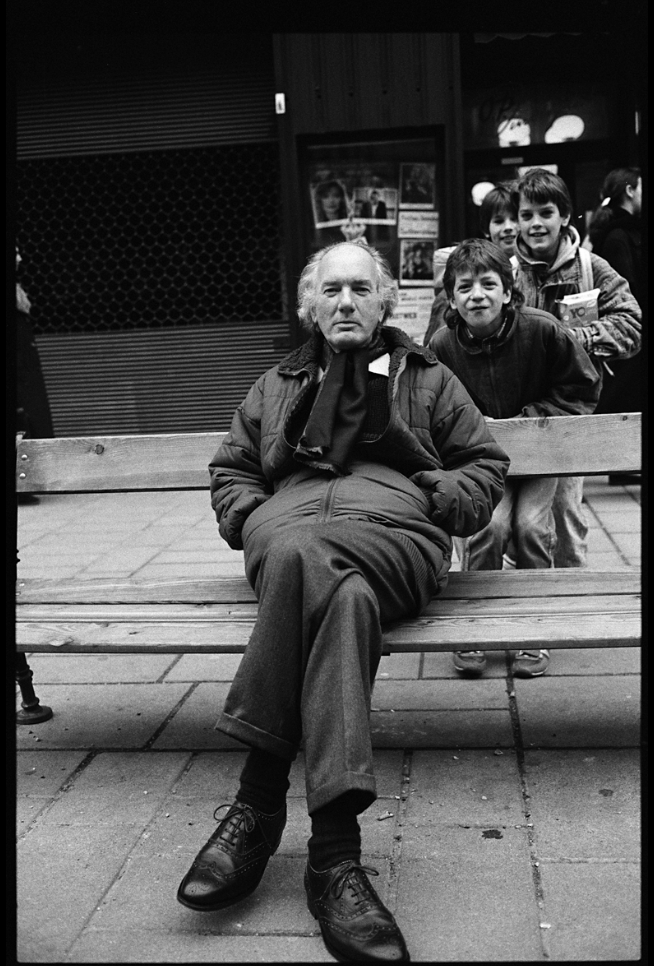“I have, in my life, turned pages a million times more often than I have read them, and always derived from turning pages at least as much pleasure and real intellectual enjoyment as from reading. Surely it is better to read altogether only three pages of a four-hundred-page book a thousand times more thoroughly than the normal reader who reads everything but does not read a single page thoroughly, he said. It is better to read twelve lines of a book with the utmost intensity and thus to penetrate into them to the full, as one might say, rather than read the whole book as the normal reader does, who in the end knows the book he has read no more than an air passenger who knows the landscape he overflies. He does not perceive the contours. Thus all people nowadays read everything and know nothing. I enter into a book and settle in it, neck and crop, you should realize, in one or two pages of a philosophical essay as if I were entering a landscape, a piece of nature, a state organism, a detail of the earth, if you like, in order to penetrate into it entirely and not just with half my strength or half-heartedly, in order to explore it and then, having explored it with all the thoroughness at my disposal, drawing conclusions as to the whole. He who reads everything has understood nothing, he said. It is not necessary to read all of Goethe or all of Kant, it is not necessary to read all of Schopenhauer; a few pages of ‘Werther’, a few pages of ‘Elective Affinities’ and we know more in the end about the two books than if we had read them from beginning to end, which would anyway deprive us of the purest enjoyment.”
— Thomas Bernhard, Old Masters: A Comedy (University Of Chicago Press, 1992)
Thomas Bernhard (1931-1989) was an Austrian novelist, playwright and poet. Bernhard, whose body of work has been called “the most significant literary achievement since World War II,” is widely considered to be one of the most important German-speaking authors of the postwar era. During his lifetime, Bernhard vociferously critiqued Austria’s public culture and courageously exposed the country’s systematic denial of its complicity with German crimes during World War II. Suffering throughout his youth from tuberculosis, Bernhard spent the years 1949 to 1951 at a sanatorium. He trained as an actor and was always profoundly interested in music: his lung condition, however, made a career as a singer impossible. After that he began to work briefly as a journalist, then as a full-time writer. Often criticized in Austria as a Nestbeschmutzer (one who dirties his own nest) for his critical views, Bernhard was highly acclaimed abroad. His work is most influenced by the feeling of being abandoned (in his childhood and youth) and by his incurable illness. His work also continually deals with the isolation and self-destruction of people striving for an unreachable perfection, since this same perfection would mean stagnancy. (Source: Wiki & Library Journal.)
Credits:
- Photograph – ACFNY (The Austrian Cultural Forum New York). Thomas Bernhard on the “Graben” in Vienna, 1988. Photo by Sepp Dreissinger.
- Quote: metaphorformetaphor.
- Thomas Bernhard bio: wiki and Library Journal on Amazon –Thomas Bernhard, The Making of an Austrian.

distillation of the essence is powerful.
LikeLiked by 1 person
But the siren calls, the pull…to finish is my Odysseus and the Sirens in the Odyssey
LikeLike
and it is oh so hard to resist –
LikeLiked by 1 person
And the Sirens wail…
LikeLike
don’t let them pull you in, put your earbuds on, take in the beautiful music, drown out their calls, and go about your day )
LikeLiked by 1 person
OK, I’m on it. 🙂
LikeLike
This is good advice for all of life, to focus and attend the thing in front of us, to stop and touch it, lift it, feel its heft. Those Sirens keep wailing…
LikeLiked by 1 person
Yes Sandy. And the sirens do keep wailing…
LikeLike
Brilliantly said! Reading of the ‘Landscapes’ it reminded me of Thomas Bernhard’s other things: “I really only write about inner landscapes and most people don’t see them, because they see practically nothing within, because they think that because it’s inside, it’s dark, and so they don’t see anything. I don’t think I’ve ever yet, in any of my books, described a landscape. There’s really nothing of the kind in any of them. I only ever write concepts. And so I’m always referring to “mountains” or “a city” or “streets.” But as to how they look: I’ve never produced a description of a landscape. That’s never even interested me.”
― Thomas Bernhard”
LikeLiked by 1 person
Thanks so much for sharing Bernard’s quote. I’m knew to him and based on these two passages, I need to dive in with additional readings. Thanks for sharing further inspiration.
LikeLike
You are welcome David.
LikeLike
That’s why they say you are the character of the last book you have read. I do feel the same when I am into a book like anything but I really like the way Sandy Sue has related it with life. It’s just amazing.
LikeLiked by 1 person
Yes.
LikeLike
Amazingly true.
LikeLiked by 1 person
It is!
LikeLike
Reblogged this on Makere's Blog and commented:
Why we read.. The joy of reading and rereading over and over again a single line, or verse, or paragraph, to dive deeply into its depths, to try to grasp the fullness of the treasures hidden within… To pause, to marvel, then dive in again..
LikeLike